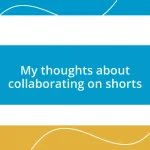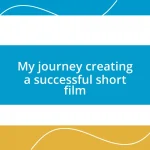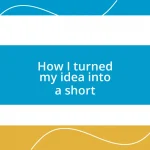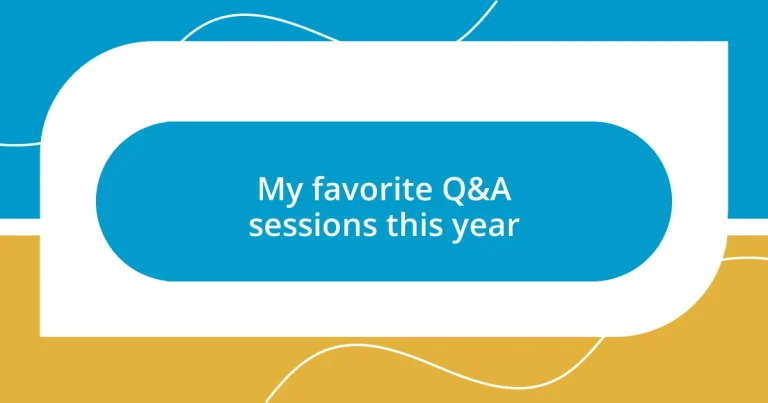Key takeaways:
- Engaging in Q&A sessions with aspiring developers highlighted the importance of mentorship and shared experiences in professional growth.
- Key themes discussed included the impact of work-life balance, mental health on productivity, and the power of supportive workplace relationships.
- Practical insights gained emphasized the need for open communication, learning from failures, and structured brainstorming to foster innovation and teamwork.
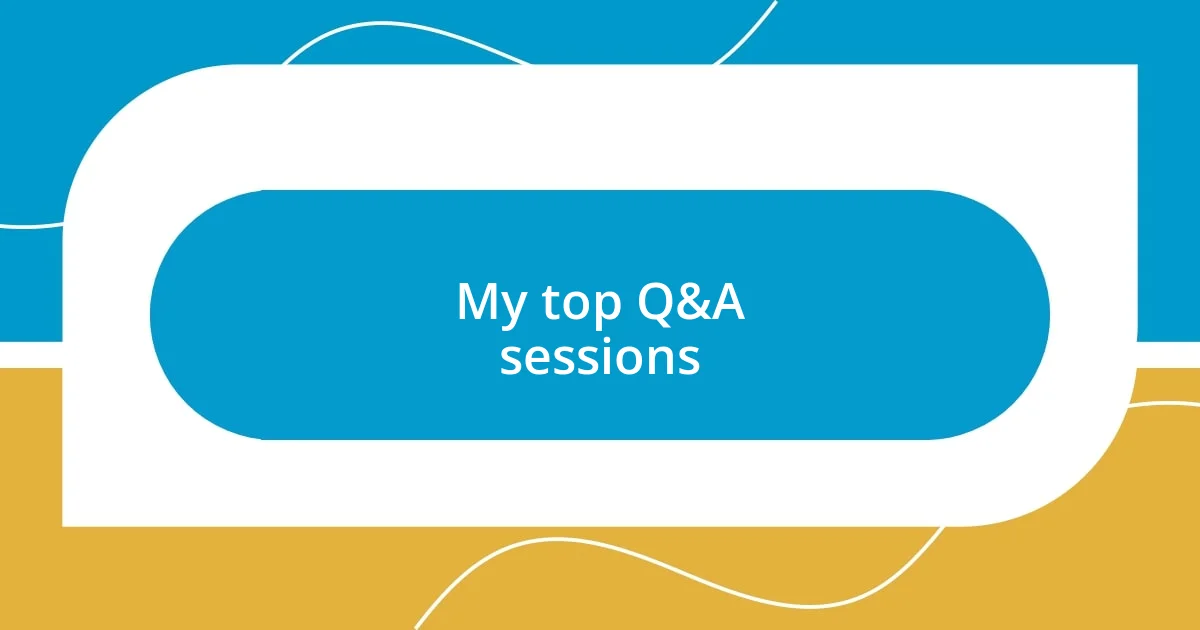
My top Q&A sessions
One of my all-time favorite Q&A sessions this year was when I got to connect with a group of aspiring developers. I remember feeling a sense of responsibility as they looked to me for guidance. Their eagerness to learn ignited a spark in me, and it made me reflect: how many times had I faced similar questions when I was starting out?
Another standout session was when we discussed the nuances of remote work tools. I was struck by the diverse perspectives shared—some participants swore by certain platforms while others had horror stories. It reminded me of my own trials with tech glitches during important meetings. Isn’t it fascinating how technology can either connect us or create obstacles?
Lastly, I cherish the time I spent answering questions about career transitions. One participant shared a heartfelt story about leaving a stable job to pursue a passion. I felt a deep resonance with their journey. How many of us have faced that daunting choice of following our dreams versus playing it safe? It’s moments like these that reaffirm my belief in the power of sharing experiences.
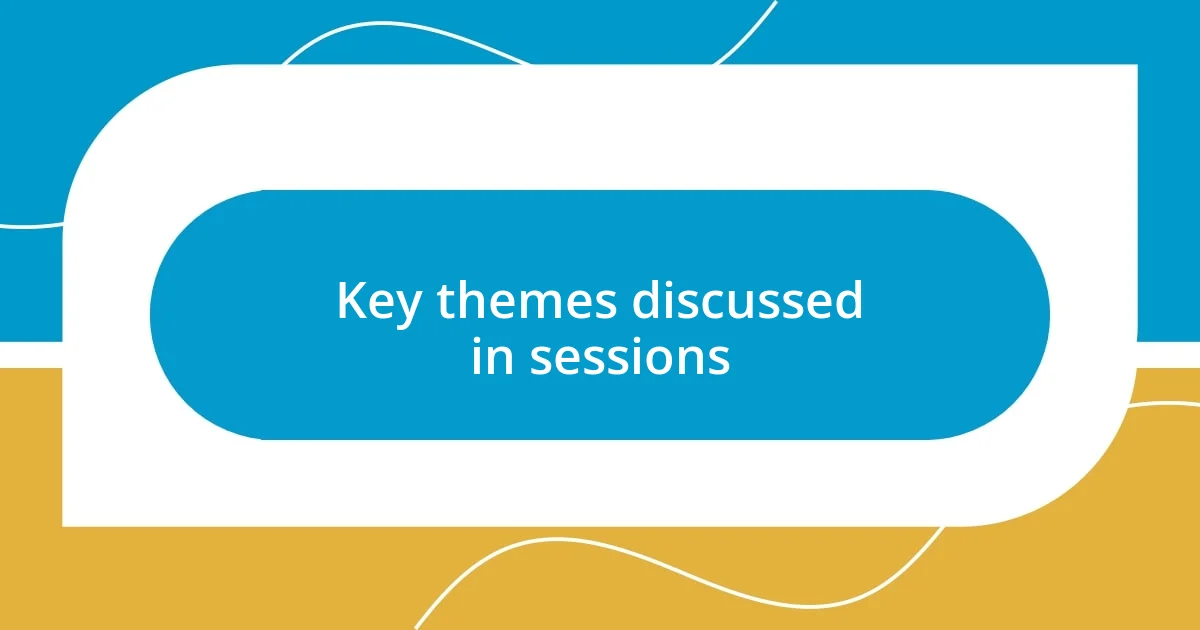
Key themes discussed in sessions
Throughout the sessions, a recurring theme was the challenges and triumphs of work-life balance. I could sense the tension in the room as participants shared their struggles with maintaining boundaries between professional and personal lives. It reminded me of a time when I overcommitted myself to projects, only to realize I was missing out on important moments with my family. These discussions were therapeutic, allowing us all to reflect and find better ways to manage our time.
- The impact of mental health on productivity
- Strategies for effective time management
- The role of supportive workplace culture
- Personal stories of overcoming burnout
- Tools and practices for maintaining boundaries
Another prevalent theme was the importance of mentorship. I vividly remember a passionate participant asking how they could effectively seek guidance in their career. Their question took me back to my first job, where a mentor’s advice helped me navigate a particularly tricky situation. The power of mentorship not only offers knowledge but also provides a safety net, fostering both personal and professional growth.
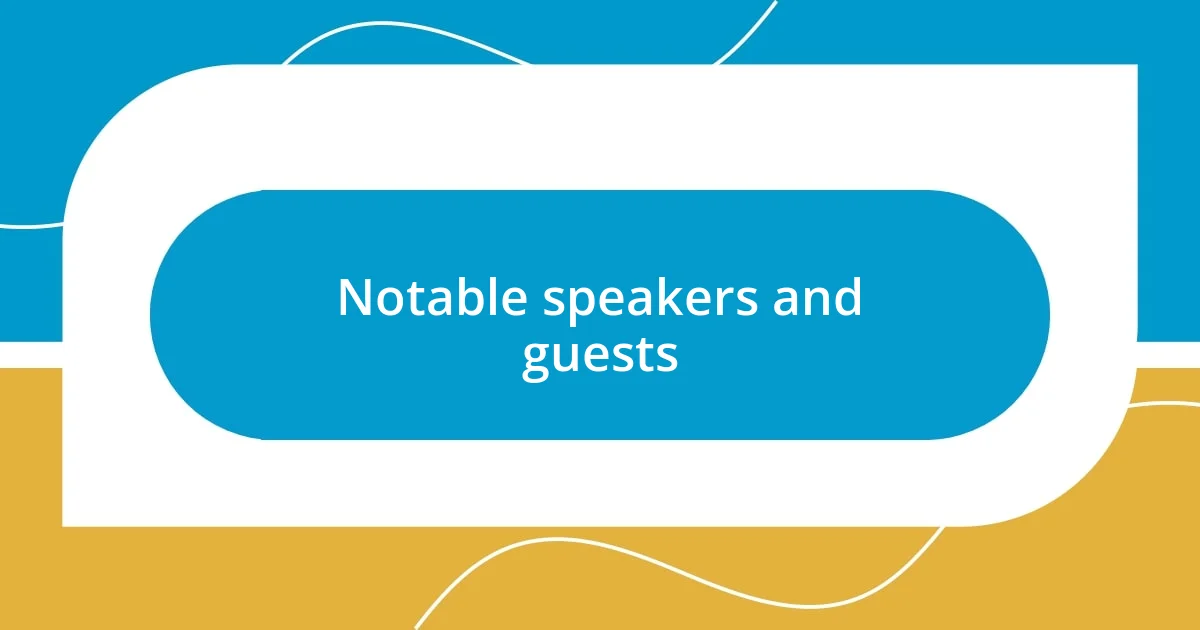
Notable speakers and guests
One of the most memorable speakers this year was a seasoned entrepreneur who passionately shared her journey through the ups and downs of starting a business. Listening to her tales of overcoming failure reminded me of my own missteps early in my career, when I learned that resilience is often more vital than initial success. It was inspiring to witness how vulnerability can spark a genuine connection, showing us that we’re all in this together.
Another notable guest was a renowned expert in cyber security, whose presentation on data protection ignited a lively discussion. I found myself engrossed in the conversation, recalling an instance where a cybersecurity breach impacted a project I was working on. We were all eager to share our experiences and fears, which transformed the session into an enlightening exchange that was both informative and relatable.
Lastly, I enjoyed listening to a panel discussion featuring diverse voices from the tech industry. Their contrasting perspectives on innovation and collaboration provided an enriching environment. It struck me how much I valued being part of such dialogues, as they often led me to rethink my own approach to teamwork. Each speaker brought unique insights, prompting me to reflect on my experiences and push the boundaries of my understanding.
| Speaker/Guest | Key Points |
|---|---|
| Entrepreneur | Resilience in the face of failure and the importance of vulnerability |
| Cyber Security Expert | The significance of data protection and lessons learned from real incidents |
| Tech Panel | Diverse perspectives on innovation, collaboration, and teamwork |
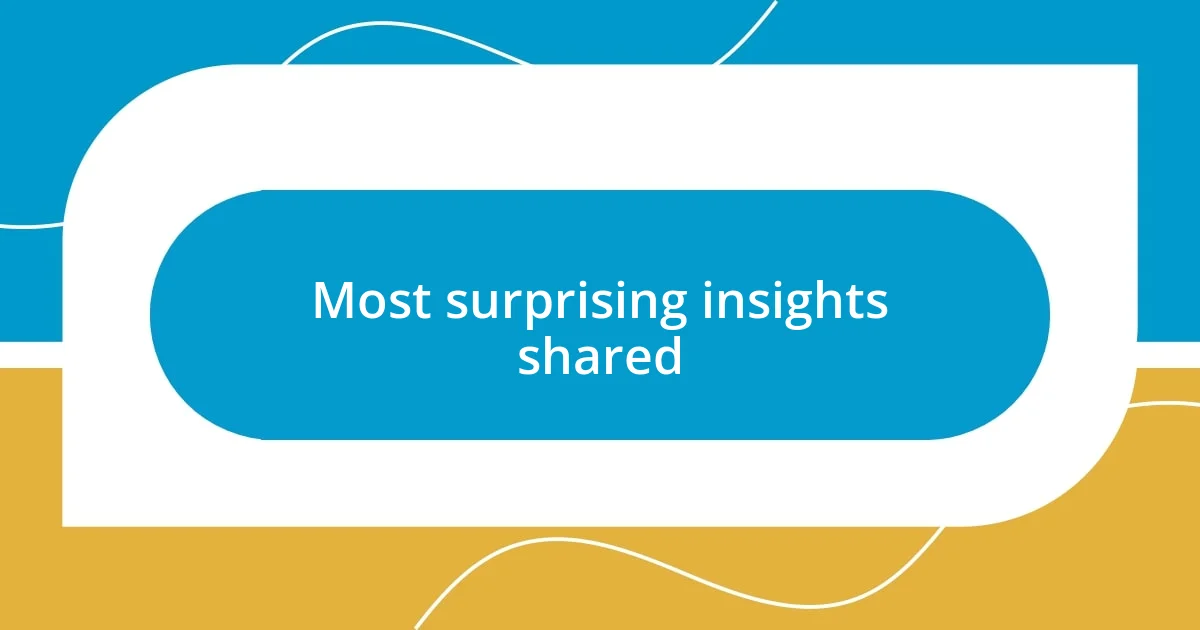
Most surprising insights shared
Among the most surprising insights shared this year was the staggering impact of mental health on productivity. One participant described a period when self-doubt clouded their focus, impacting their work outcomes significantly. It made me ponder—how often do we overlook the mental toll of our work pressures? Understanding this connection can lead us towards fostering more compassionate workplace cultures, enhancing not just well-being but overall efficiency.
Another unexpected revelation was the profound effect of supportive relationships at work. A story stuck with me about a team that prioritized emotional check-ins, resulting in not just happier employees, but also higher project success rates. This insight resonated deeply; it reminded me of my own team, where simple acts of checking in transformed our dynamic. Why is it that we often underestimate the power of connection in the workplace?
Lastly, several individuals shared their innovative practices for maintaining boundaries, which left me reflecting on my own habits. One person spoke about a digital detox weekend, where they completely unplugged from work-related devices. This got me thinking—when was the last time I truly let myself disconnect? Such ideas not only prompted me to reevaluate my approach but also reminded me that sometimes the simplest actions can lead to the most profound changes in our work-life balance.
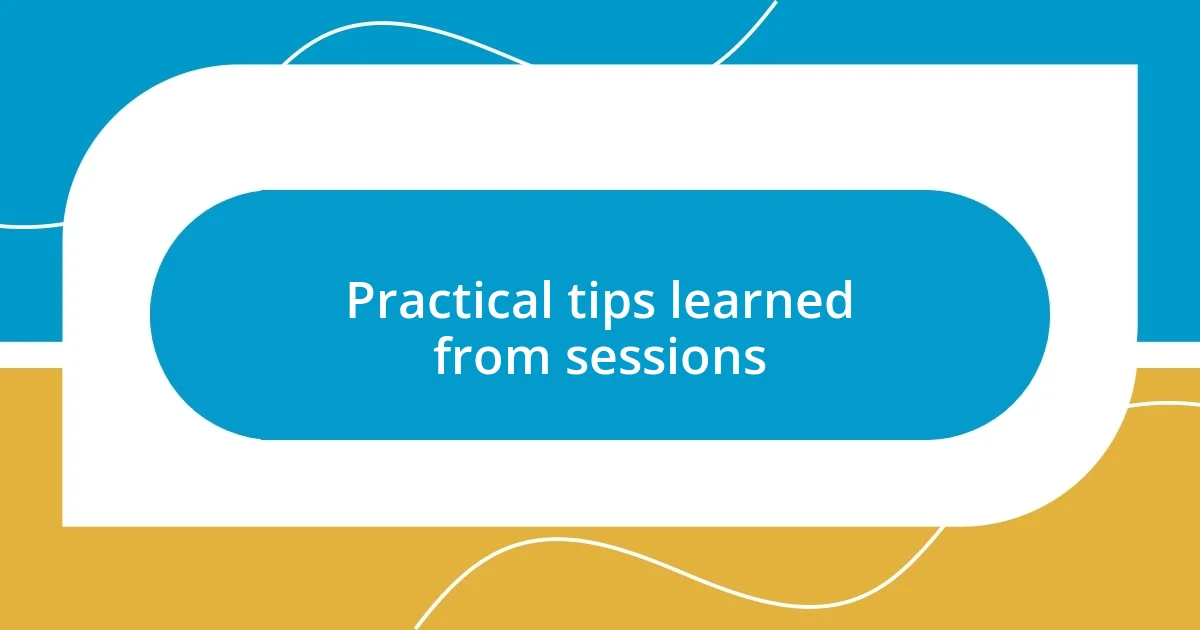
Practical tips learned from sessions
One practical tip I gleaned from a session was the importance of creating a feedback-friendly culture. I once worked on a project where we implemented regular feedback loops, and I witnessed firsthand how much they could transform our team dynamics. It made me realize that when team members feel safe to share their thoughts, not only do we enhance our performance, but we also foster a deeper trust among ourselves. Have you ever experienced the power of open communication? It can truly shift the entire atmosphere of a team.
Another invaluable lesson came from a discussion on prioritizing learning opportunities. One speaker emphasized that every failure should be treated as a stepping stone rather than a setback. Reflecting on my own journey, I can think of times when I faced challenges that initially seemed daunting, but ultimately led to significant growth. By embracing a mindset of continuous learning, we can turn obstacles into advantages. How often do you challenge yourself to learn from past experiences?
Lastly, I learned about the effectiveness of structured brainstorming sessions. During one interactive workshop, we engaged in a creative exercise that allowed everyone to contribute their ideas without inhibition. I found that giving each person a chance to express themselves increased engagement and sparked innovative solutions. It left me wondering—how often do we miss out on great ideas simply because we don’t provide everyone a chance to shine? Understanding this can reshape how we approach problem-solving in our own teams.
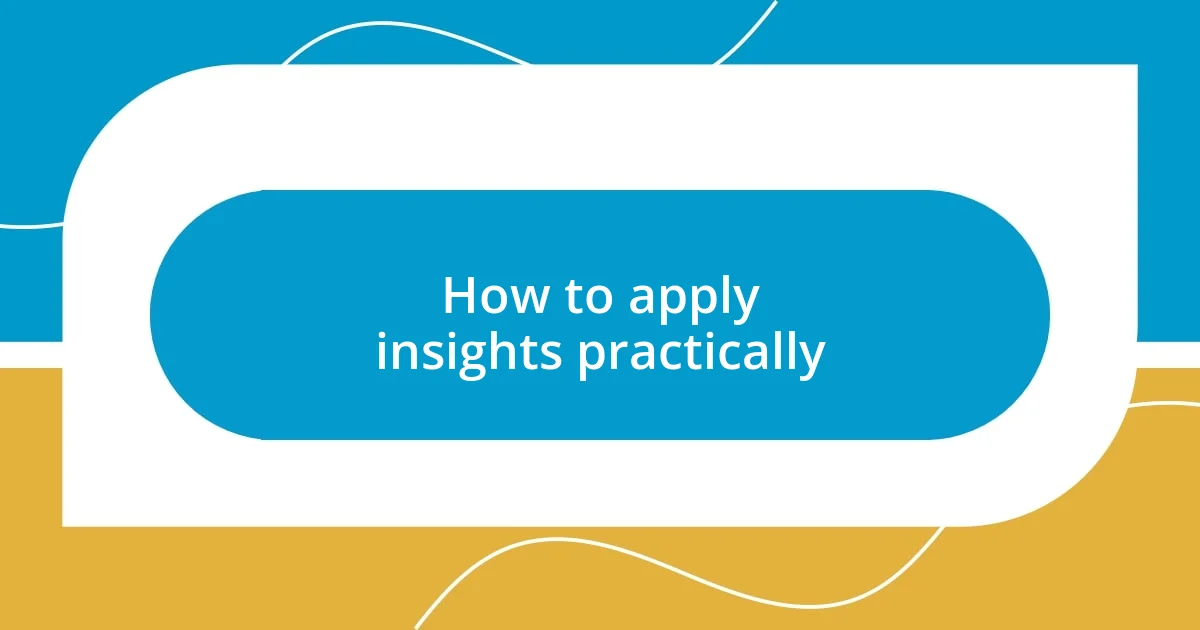
How to apply insights practically
Taking insights from discussions and applying them practically can work wonders, especially in boosting team morale and productivity. One approach I’ve embraced is encouraging regular check-ins with my colleagues. I remember a time when I initiated a simple weekly touch-base, and the conversations flowed organically. It was surprising to see how quickly our team bonded, sharing challenges and celebrating small wins. Have you ever considered how these short interactions could reshape your team’s dynamic?
Another strategy I employ is integrating learning from setbacks into our projects. For instance, I recall a particular project that didn’t go as planned. Instead of dwelling on the mistakes, we held a retrospective session to dissect what went wrong. This created an environment where vulnerability was accepted, and everyone actively participated in identifying solutions. Reflecting on this experience, I realized that transforming challenges into collaborative learning opportunities not only builds resilience but also nurtures a strong collaborative spirit. How often do you harness lessons from failures in your own work?
Finally, implementing structured brainstorming sessions has been a game-changer for me. During one memorable session, I experimented with encouraging silent idea generation before group discussions. Surprisingly, many voices that typically went unheard bubbled to the surface, leading to richer discussions. This taught me that sometimes, stepping back can actually allow more insights to emerge. How do you create space for the quieter voices in your discussions?
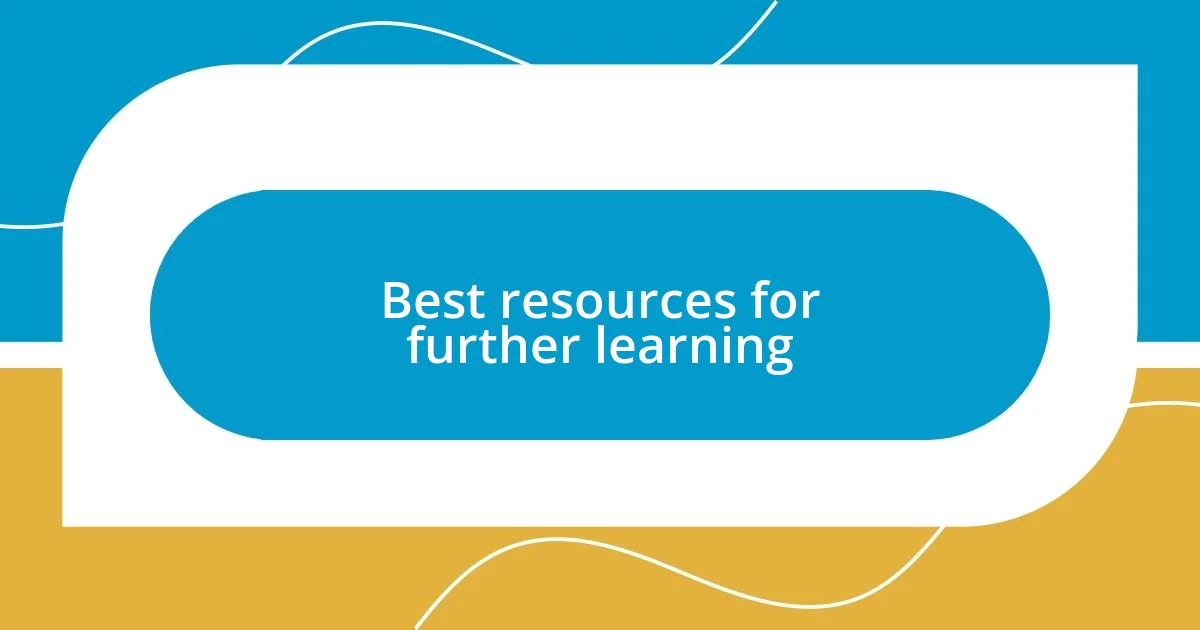
Best resources for further learning
When it comes to expanding my knowledge in QA, I find that online courses are invaluable resources. For example, I recently enrolled in a course on advanced testing strategies, and it completely reshaped my approach. Have you ever taken a course that shifted your perspective? The blend of theory and practical exercises allowed me to grasp complex concepts more thoroughly, enhancing my skills in real-world scenarios.
Another great resource is community forums and discussion groups dedicated to QA. Being a part of these platforms has connected me with like-minded professionals and provided me with fresh insights. I remember a time when a member shared a breakthrough method for bug tracking, which I immediately adopted in my own workflow. Engaging with others not only helps to stay updated but also fosters a sense of belonging and shared purpose—how often do we overlook the power of community in our professional growth?
Books are also a treasure trove of knowledge. One of my favorites is “Lessons Learned in Software Testing” by Cem Kaner, which I found incredibly relatable. His anecdotes resonate with my own experiences of trial and error in testing environments. Reflecting on the lessons from such literature can be a game-changer—what’s the last book you read that fundamentally changed the way you work? Overall, I believe that diversifying learning resources not only deepens understanding but enriches our professional journey.





